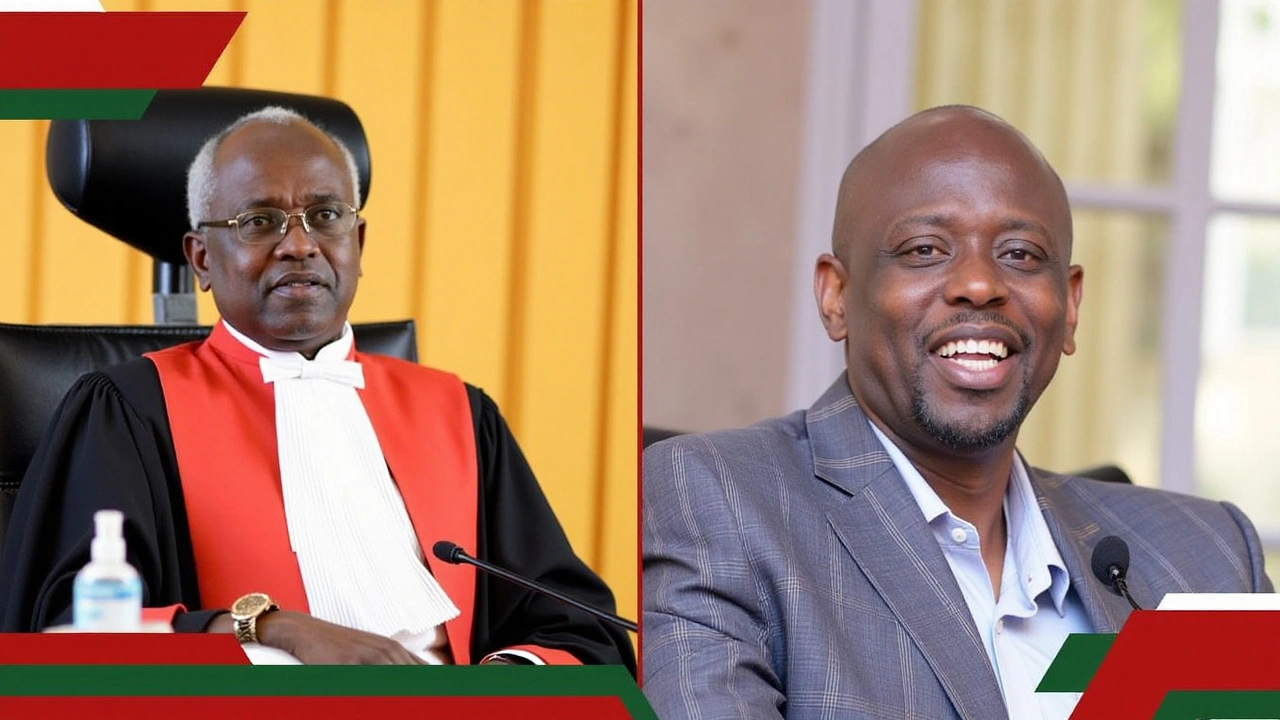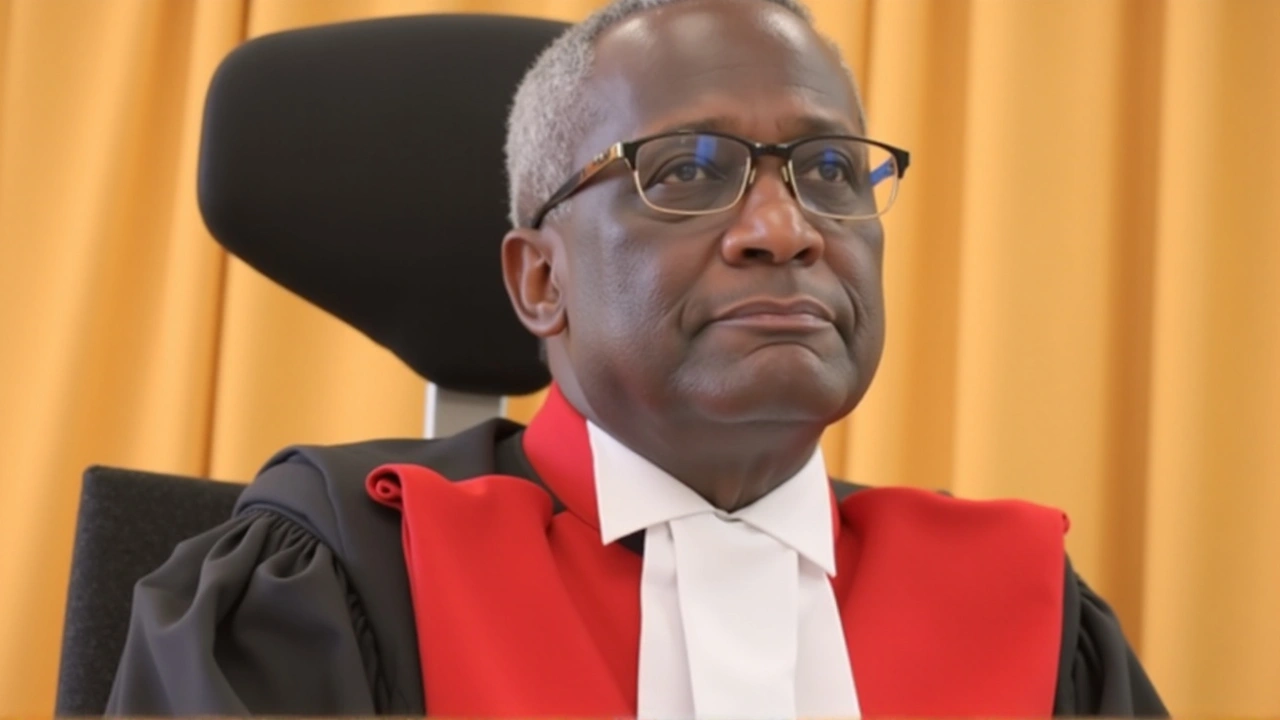Urgent Call for Action from Justice Lenaola
In a significant address that has stirred political waters in Kenya, Supreme Court Justice Isaac Lenaola has sharply criticized the country's Executive and Parliament over their apparent lack of urgency in appointing officials to the crucial Independent Electoral and Boundaries Commission (IEBC). Justice Lenaola warned that without a fully functional electoral commission, the democratic foundations of the nation could be at stake. His statements came after attending a regional conference focusing on the utilization of Artificial Intelligence, digital platforms, and social media in the elections of Kenya, emphasizing the technological orientation for future electoral processes.
Questioning Government Priorities
Justice Lenaola did not mince his words when he questioned the priorities of the government. He observed that while politically charged legislation sailed through the legislative process at remarkable speeds, crucial reforms such as the reconstitution of the IEBC were consistently sidelined. The need for a stable and reliable electoral body is evident to maintain the nation’s democratic fabric. Yet, the delays in appointments are creating a void that jeopardizes Kenya's political stability.
Insights from Recent Judicial System Failures
During his speech, Justice Lenaola referred to a recent incident where judicial system outages, particularly affecting the e-filing and case tracking systems, were glaringly visible during the impeachment trial of former Deputy President Rigathi Gachagua. He underscored the need for resilience in public systems, drawing a parallel to the electoral framework, which if compromised, could lead to more severe democratic deficits. Lenaola implored Kenyans to ponder these vulnerabilities as the nation heads toward the 2027 general elections.
Role of Citizen Activism
Reflecting on the power of citizen voices, Justice Lenaola made a bold call for the use of social media platforms to galvanize public pressure on political leaders. He suggested that hashtags such as #AppointIEBCNow could serve as powerful tools in demanding action from lawmakers. This social media strategy not only raises awareness but also uniquely empowers citizens to advocate for their democratic rights.

Prolonged Absence of IEBC Commissioners
Highlighting a specific critical point, Justice Lenaola drew attention to the fact that it has been nearly two years since the last group of IEBC commissioners left office, leaving the commission without leadership. This void is not only administrative but also fundamentally operational, hampering tasks such as the boundary reviews crucial to the electoral process. Despite a mandate that should have seen boundary reviews completed by March 2024, these tasks remain stalled due to the absence of commissioners, opening up potential avenues for legal challenges and disputes that may infringe on the constitutional rights of Kenyans.
Warning from Attorney General Justin Muturi
Attorney General Justin Muturi has reinforced the imperative of strict adherence to the Constitution, warning against any contraventions that could undermine the nation’s democratic integrity. Compliance with constitutional tenets is critical not just for upholding the rule of law but also for ensuring fair and transparent electoral processes where citizen representation is genuinely reflected.
Risks of Constitutional Infractions
Amid these warnings, concerns continue to rise over potential legal challenges that could jeopardize electoral fairness. A functional IEBC is paramount to protecting the sovereign right of each Kenyan to fair representation and participation, ensuring that the machinery underpinning democracy performs effectively during elections. Lenaola's emphasis on the need for a full commission echoes a widespread demand for swift government action to avoid a crisis in governance.
Conclusion: A Call to Action
Justice Lenaola's words serve as both a warning and a call to action for the Kenyan government and its citizens. As the clock ticks, the need for an efficiently managed electoral process is becoming increasingly urgent. The nation's eye is now on its leaders to prioritize and protect the electoral body, ensuring the democratic tradition of Zambia remains intact and its future elections credible.




Justice Lenaola's warning should be taken seriously, because a non‑functional IEBC jeopardizes every election. The executive's habit of fast‑tracking politically convenient bills while ignoring institutional reforms is a clear sign of misplaced priorities. Without commissioners, the boundary review process stalls and creates openings for legal disputes. A functional electoral commission also safeguards the integrity of digital voting platforms that Kenya hopes to adopt. The court's critique is a reminder that constitutional obligations cannot be postponed indefinately.
It is absolutely absurd that the government pretends to care about democracy while leaving the IEBC in limbo 😡🚨. This kind of negligence undermines the very foundation of free and fair elections. The Supreme Court has called them out, and the public must amplify that call with every platform available. #AppointIEBCNow is not just a hashtag; it’s a demand for constitutional compliance.
Totally agree with the court! We need that commission up and running ASAP. No more delays, no more excuses. The country deserves a board that can actually handle the tech side of voting.
Let’s remember that citizen activism can shift the balance of power. When people unite behind a clear message, lawmakers feel the pressure. It’s essential to keep the conversation focused on the need for an operational IEBC rather than getting sidetracked by partisan debates. Solidarity among voters will make a difference.
The abandonment of the IEBC reflects a troubling disregard for Kenya’s sovereign right to self‑determination in electoral matters. By stalling appointments, the government endangers the nation’s democratic integrity, a cornerstone of our independence. It is imperative that Kenyan leaders act swiftly to restore the commission, lest foreign interference find fertile ground in the ensuing chaos. National pride demands an accountable election body.
Ugh this whole thing is just a mess the politicians love to play with they think we’ll just sit back but nope the democracy is on the line and they keep dragging their feet it's pure drama
The call for immediate appointments to the Independent Electoral and Boundaries Commission is more than a bureaucratic request; it is a fundamental demand for the preservation of Kenya’s democratic ethos.
The highest court stepping forward to highlight systemic failures signals a crisis that cannot be ignored by any responsible citizen.
The prolonged vacancy of IEBC commissioners has created a vacuum that threatens the legitimacy of boundary reviews, voter registration processes, and ultimately, the credibility of upcoming elections.
In the age of digital transformation, where electronic voting and social media influence are increasingly intertwined, an operational commission becomes the backbone of a secure electoral infrastructure.
Moreover, the delays undermine public confidence, as voters begin to question whether their votes will be counted fairly and transparently.
Historical precedents in other African nations show that prolonged absence of a functional electoral body often leads to contested results and, in worst cases, civil unrest.
The Kenyan Constitution explicitly mandates the timely constitution of the IEBC, reflecting the foresight of the framers to protect electoral integrity.
Justice Lenaola’s remarks serve as a reminder that constitutional obligations are not optional guidelines but enforceable duties.
The involvement of civil society and the strategic use of hashtags like #AppointIEBCNow can amplify pressure, turning public sentiment into actionable political force.
Social media platforms, while sometimes a source of misinformation, can also act as catalysts for accountability when citizens coordinate their voices.
The executive and parliamentary branches must recognize that postponing these appointments is not a neutral administrative decision but a political gamble with the nation’s future.
By appointing qualified, non‑partisan commissioners, Kenya can safeguard its elections against manipulation and external interference.
The upcoming 2027 elections present an opportunity to demonstrate resilience, but only if the IEBC is restored to full capacity well before the campaign season begins.
Citizens should remain vigilant, continue to demand transparency, and hold their leaders accountable through peaceful protest and legal avenues.
In the end, the health of democracy rests on the collective will of the people to insist that institutions function as intended, and the IEBC is no exception.
Honestly, blowing up over an IEBC delay seems a bit over the top; governments have bigger fish to fry than filling seats on a commission. While transparency is important, the constant hashtag frenzy can drown out more pressing issues like economic reforms. It's easy to rally online, but real change comes from policy, not just social media noise.
Hey everyone 🌍, I love seeing how technology can boost our voting systems, but the IEBC’s current empty chairs are a massive roadblock 🙈. When the Supreme Court steps in, it shows how serious the situation is, and we can’t just ignore it 🙃. The boundary reviews need experts, not political placeholders, otherwise the whole election map could get messed up 😬. Even though I sometimes mistype, the message stays clear: we need those commissioners back now! Let’s use our platforms to keep the pressure on, because a solid electoral commission means a stronger democracy for all of us 😊.
You've hit the nail on the head – the public must keep the conversation alive and push for swift appointments. By staying engaged and sharing accurate information, we empower each other to demand accountability. Let’s keep the momentum going and make sure every voice is heard.
the whole thing is a circus no one wants but the show goes on
I get that this is a big deal but also see that there are many moving parts behind the scenes. While we wait for the IEBC to be reassembled, maybe it's a good time to look at other reforms that could strengthen the electoral process. Keeping a relaxed yet informed stance helps prevent panic.
Yo the IEBC drama is pure fireworks of chaos!